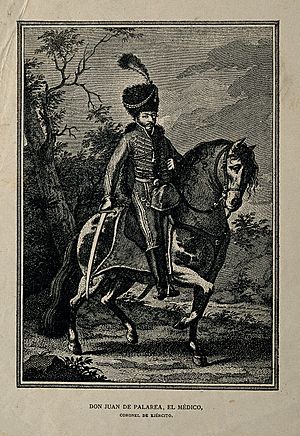Juan Palarea Blanes facts for kids
Juan Palarea Blanes (born December 27, 1780 – died March 7, 1842) was a brave Spanish leader. People also knew him as el Médico, which means "the Doctor." He was a doctor, a politician, and a special kind of soldier called a guerrillero. He fought during the Peninsular War in Spain. Later, he became a very important military leader, like the Captain General of Valencia and Murcia in 1836.
Contents
Early Life of Juan Palarea
Juan Palarea Blanes was born in a town called San Andrés in Murcia, Spain. This was on December 27, 1780. His family was middle-class. He went to a school run by Franciscan monks. He left school before finishing his studies there. After that, he decided to study medicine. He went to the city of Zaragoza to learn how to be a doctor. Later, he started working as a doctor in Villaluenga de la Sagra. This town is in the province of Toledo.
Fighting in the Peninsular War
When news reached him about the Dos de Mayo Uprising in Madrid in May 1808, Juan Palarea acted quickly. This uprising was when the Spanish people rebelled against the French army. Palarea decided to form a group of fighters. They wanted to fight against the forces of Joseph-Napoleon Bonaparte. Joseph-Napoleon was the brother of Napoleon and was made king of Spain by his brother.
Their first fight happened in July of that year. It was near the Guadarrama river. Palarea and his group set up a surprise attack. They ambushed a group of twenty French soldiers. They kept fighting in small, quick attacks until August. That's when Joseph I left Madrid.
Palarea was in Madrid when Napoleon himself entered the city. He joined the fighting at Buen Retiro park. This happened on December 3 and 4. But Madrid soon gave up to the French. So, Palarea went back to Villaluenga.
His group of fighters were called guerrillas. They were not part of the regular army. They fought in many battles, like Alhama and Las Navas del Marqués. Between 1808 and 1810, they had many small fights. They even attacked inside Casa de Campo in Madrid in August 1810. This used to be a royal hunting ground. Palarea's group had to retreat. By the end of 1810, his force had 270 volunteers. Palarea was given the rank of Lieutenant Colonel.
One famous story is about the Battle of the Chapel of Yuncler. Palarea's guerrillas attacked some French troops. The French soldiers hid inside the Chapel of Yuncler. Palarea noticed the wind was blowing towards the chapel. He asked the townspeople to bring sulfur and chili powder. A local woman, Juliana Carrillo, helped gather these things. They lit a small fire near the chapel. The smoke filled the chapel, making it hard for the soldiers to breathe. They were forced to give up. Because of this clever action, Palarea was later considered for a special award. This award was the Laureate Cross of Saint Ferdinand.
In 1811, Palarea led light horsemen and irregular troops. He worked with other Spanish regiments. They helped in the Battle of Arapiles. Their main job was to stop messages from reaching the French general Auguste Marmont. This helped the combined forces of British and Portuguese troops. These troops were led by the Earl of Wellington. In 1812, Palarea was there when the Spanish constitution was signed. Soon after, he was given command of his own horse regiment. It was called "Regimiento de Húsares Numantinos." He led this regiment in the Battle of Los Altos Sorauren in 1814.
Political Changes in Spain
During the years of the Trienio Liberal (1820-1823), Spain tried to have a more liberal government. Palarea was chosen to be a member of the Spanish parliament. He became one of the liberal leaders.
Later, during a time called the Ominous Decade (1823-1833), the monarchy was restored. Palarea traveled to Santoña. He wanted to create a group to fight against the Royalist forces. These forces were being helped by the French. Palarea faced defeats in battles near León and Oviedo. He was also defeated near Gallegos del Campo. He and his troops had to retreat towards Zamora. During this retreat, French general Bourque captured Palarea. He was taken as a prisoner to France. But Palarea managed to escape to England. He wanted to return to Spain and bring back democratic rule. He finally returned to Spain in 1833.
Role in the First Carlist War
In 1835, Queen Maria Cristina's government was in power. Palarea was put in charge of the armed forces in Aragón. He was also made a Mariscal de Campo, a high military rank. His command defeated the Carlist general Ramón Cabrera y Griñó twice. The Carlist Wars were civil wars in Spain. They were fought between those who supported Queen Isabella II and those who supported Don Carlos. In 1836, Palarea was promoted again. He became the Captain General of Valencia and Murcia. He was also second in command of Jaén and Granada.
In January 1839, Palarea was chosen to be a senator. He passed away from natural causes in Cartagena on March 7, 1842.
Honors and Legacy
A street in the town of San Basilio in Murcia is named after him. It is called 'Calle General Palarea'.
See also
 In Spanish: Juan Palarea y Blanes para niños
In Spanish: Juan Palarea y Blanes para niños
 | Sharif Bey |
 | Hale Woodruff |
 | Richmond Barthé |
 | Purvis Young |


